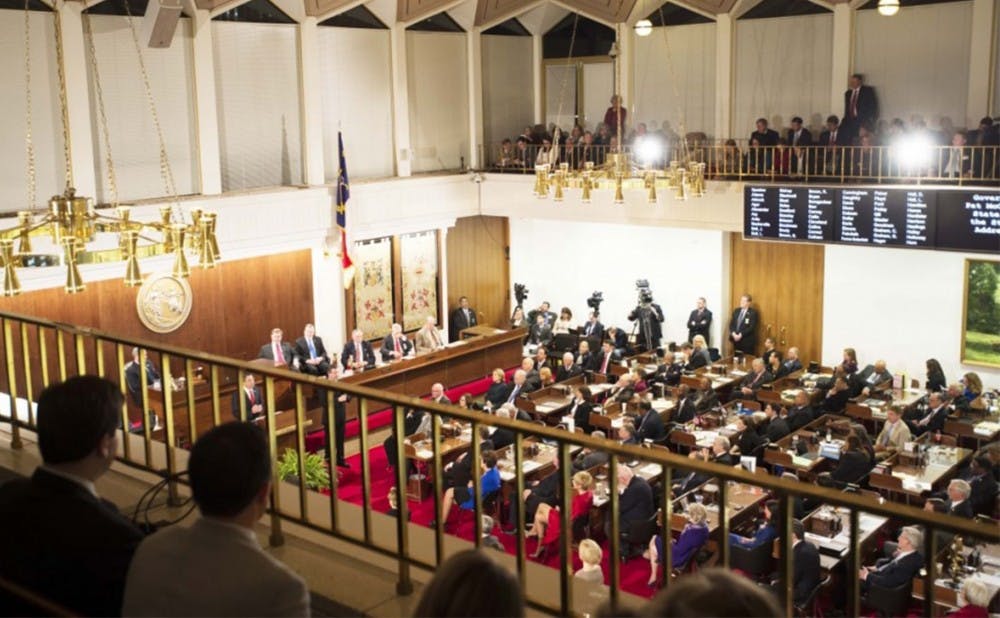The passage of House Bill 2 in North Carolina March 23 has led to a national backlash, raising concerns that the bill will have negative effects on the state’s economy.
The legislation came in response to a February ordinance passed in Charlotte that created anti-discrimination provisions for LGBTQ customers at private businesses and allowed transgender people to use the bathroom of the gender they identified with. The bill revoked that ordinance, restricted bathroom use to a person’s “biological sex” and banned local governments from creating their own anti-discrimination policies.
In response to significant backlash from celebrities and businesses, Governor Pat McCrory signed an executive order Tuesday stating he would strengthen workplace protections for state employees—but he stopped short of altering the bill’s provision limiting which bathrooms transgender people can use.
“This bill has very real, very concrete consequences for Durham and our state,” said Wendy Jacobs, a Durham county commissioner. “We really want to make it known to the world that [HB2] does not represent the values of Durham. The Durham City Council, the Durham County commissioners and the school board have all come out strongly against HB2.”
Durham City Council passed a resolution April 7 calling for the repeal of House Bill 2 and arguing that the law is unconstitutional.
Numerous businesses have canceled plans to expand into North Carolina because of the law. PayPal announced April 4 that it would no longer be moving its global operations center to Charlotte. The center was expected to employ approximately 400 people.
Two companies, Red Ventures and Braeburn Pharmaceuticals, have similarly stated that they will re-evaluate their expansion into North Carolina. Deutsche Bank also announced it would freeze its plan to move 250 jobs to Cary, and the National Basketball Association may also choose to withdraw its business from the state.
“The NBA is dedicated to creating an inclusive environment for all who attend our games and events,” the league wrote in a statement March 24. “We are deeply concerned that this discriminatory law runs counter to our guiding principles of equality and mutual respect and do not yet know what impact it will have on our ability to successfully host the 2017 All-Star Game in Charlotte.”
Aaron Chatterji, associate professor in the Fuqua School of Business, noted that as some companies choose to move their businesses, others are voicing their opinions via social media.
“Other CEOs and companies are voicing displeasure on Twitter, like Mark Benioff [CEO of computing company Salesforce] or signing onto the Human Rights Campaign’s letter to Governor McCrory,” he said. “Depending on the characteristics of the company, they’re taking different actions.”
Chatterji said his research has found that outcries from businesses had an impact last year when Indiana passed the Religious Freedom Restoration Act, which was seen by many as discriminatory.
“There are all these demographic, public opinion variables that matter, so I don’t know if it’s going to have an impact in North Carolina, but we’ll see,” he explained. “Obviously [businesses] have power in economic terms, but the question is whether that power will be enough to sway politicians.”
Jacobs noted that the bill would have broader impacts than just limiting bathroom use for transgender people.
“If you feel like you’ve been discriminated against because of your age, or your race, or because you’re handicapped, or you’re a veteran, you have lost your rights in this bill,” Jacobs said. “And the bathroom aspect of it is really a smokescreen for this being an anti-labor bill. That’s what this bill really is.”
New York City, and state, as well as San Francisco, Seattle, the District of Columbia and Boston have also chosen to ban non-essential travel by government employees to North Carolina.
Musician Bruce Springsteen cancelled his April 10 concert in Greensboro in response to the bill. The law has also been targeted by a number of comedy and late-night routines, including “The Daily Show” with Trevor Noah, “Late Night” with Seth Meyers and “Saturday Night Live.”
Businesses in Durham have made their own statements, with many choosing to display anti-HB2 signs in their shop windows. One such business is Vaguely Reminiscent, a boutique located on Ninth Street near East Campus.
“Everyone here feels pretty strongly about it,” said Karen Merowcheck, a store employee. “One of our employees printed the sign at home so we could hang it up. It wasn’t like an official movement. I think people are taking it upon themselves to print and hang their own signs.”
Merowcheck added she thought it was unlikely that their gesture would have an impact on the legislature.
“Our response is more for the people and to help people feel welcome and not alienated or isolated—that the majority of us don’t support this bill and don’t feel that way,” she said. “It’s just a way for us to support the community.”
Jacobs said that Durham officials are trying to “send a message” that they do not share the views of the bill.
“We will all be coming together as a community to say to the world, ‘please come to Durham, we welcome you and who we are is not what House Bill 2 says,’” Jacobs said.
Sarah Kerman contributed reporting.
Get The Chronicle straight to your inbox
Signup for our weekly newsletter. Cancel at any time.

